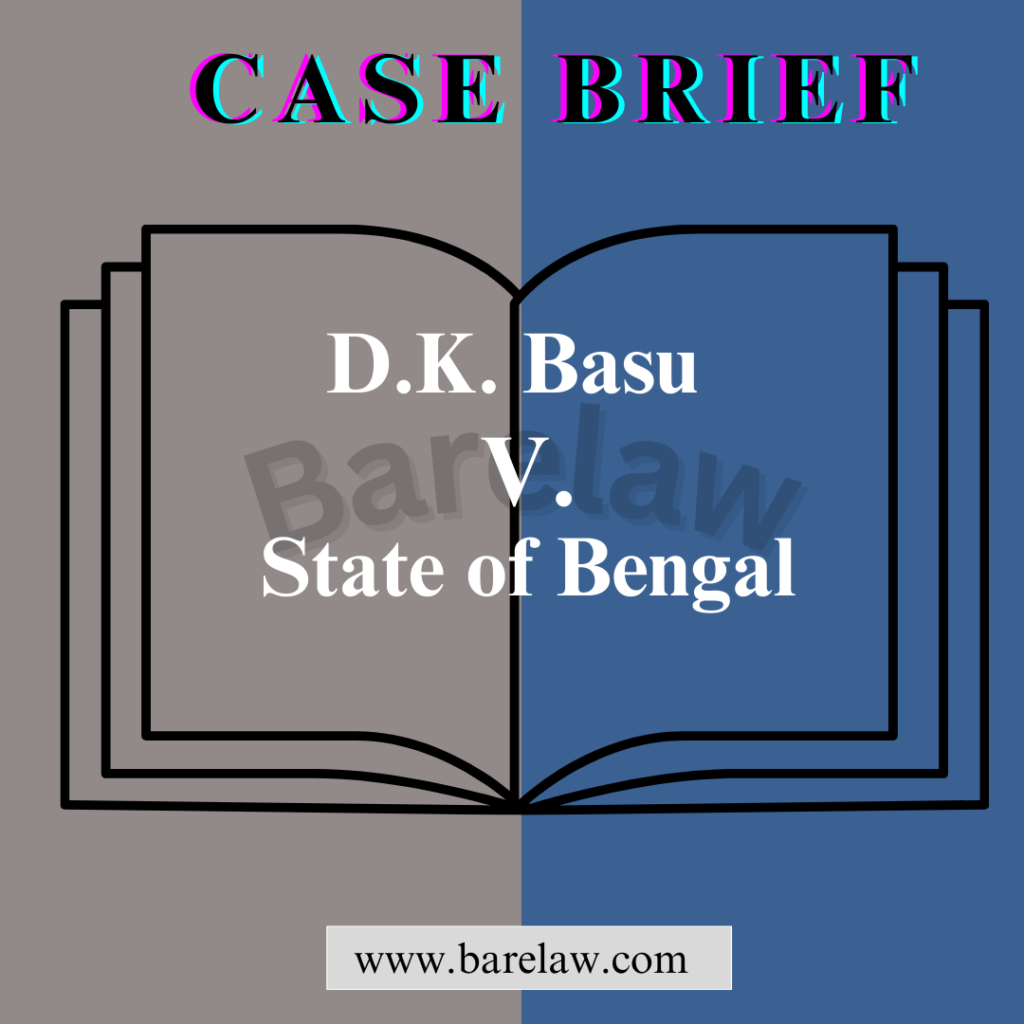
Table of Contents
SC Guidelines on Arrested Person’s Rights: Protecting Liberty and Dignity
SC Guidelines on Arrested Person’s Rights: Protecting Liberty and Dignity
Arrest is a crucial tool in the hands of law enforcement agencies to maintain law and order. However, the power to arrest also poses a significant risk to individual liberty and dignity. To strike a balance between the needs of law enforcement and the protection of fundamental rights, the Supreme Court of India, in its landmark judgment in D.K. Basu v. State of Bengal, laid down comprehensive guidelines to safeguard the rights of arrested persons. These guidelines are instrumental in ensuring that the arrest and detention process remains fair and just, upholding the principles of justice, liberty, and dignity.
The Genesis of the D.K. Basu Case:
Before delving into the specific guidelines set forth by the Supreme Court, it is essential to understand the context and circumstances that led to the historic D.K. Basu case. The case arose from a series of incidents involving custodial deaths and police brutality in West Bengal. The petitioners alleged that these incidents were indicative of the pervasive violation of the rights of arrested persons.
In response to these serious allegations, the Supreme Court took suo motu cognizance of the matter and initiated proceedings. This marked the beginning of an exhaustive legal journey that culminated in a judgment that has had a profound impact on the criminal justice system in India.
Fundamental Rights and Arrest:
Arrest, by its very nature, impinges upon an individual’s fundamental rights. Article 21 of the Indian Constitution guarantees the right to life and personal liberty, and any violation of this right is a matter of grave concern. The D.K. Basu case recognized the importance of these rights and sought to create a robust framework to protect them during the process of arrest and detention.
Key Guidelines from the D.K. Basu Case:
- Mandatory Recording of Arrest: One of the pivotal guidelines laid down by the Supreme Court is the requirement for the police to prepare a memo of arrest at the time of arrest. This memo should contain details such as the date, time, place of arrest, and the identity of the arresting officer. This ensures transparency and accountability in the arrest process.
- Information to a Family Member or Friend: The arrested person has the right to inform a friend or family member about their arrest and place of detention. The police must also inform the arrested person of this right.
- Medical Examination: It is mandatory for the arrested person to undergo a medical examination by a qualified doctor. This examination should be conducted at the time of arrest, and a copy of the medical report should be provided to the arrested person.
- Review by Magistrate: An arrested person must be produced before the nearest magistrate within 24 hours of arrest, excluding the time necessary for the journey. This safeguard prevents arbitrary and prolonged detention.
- Prohibition on Torture and Cruelty: The guidelines explicitly prohibit any form of physical or mental torture during interrogation. This is in line with India’s commitment to international conventions against torture.
- Right to Legal Representation: The arrested person has the right to be represented by a lawyer of their choice during interrogation. This ensures that the person is adequately protected during questioning.
- Compensation for Illegal Detention: If it is found that the arrest was illegal or unjustified, the person is entitled to compensation. This serves as a deterrent against arbitrary arrests.
- Duty of Senior Police Officers: The guidelines emphasize the responsibility of senior police officers to ensure that these safeguards are strictly followed by their subordinates.
Impact and Implications:
The D.K. Basu case and its subsequent guidelines have had a far-reaching impact on the criminal justice system in India. They have not only provided much-needed protection to the rights of arrested persons but have also led to increased accountability within the police force.
These guidelines have been a valuable tool for human rights activists, lawyers, and the judiciary to challenge cases of police brutality and illegal detention. They have also acted as a deterrent, reducing the instances of custodial violence and abuse.
Moreover, the D.K. Basu case serves as a testament to the Indian judiciary’s commitment to upholding the principles of justice, liberty, and dignity enshrined in the Constitution. It reinforces the idea that no one is above the law, and the state must act responsibly and within the bounds of the law even in the pursuit of justice.
Challenges and Future Directions:
While the D.K. Basu guidelines have been instrumental in safeguarding the rights of arrested persons, challenges remain. Implementation of these guidelines varies across states, and instances of custodial violence and abuse still persist. The need for continued awareness, training of law enforcement personnel, and vigilance by civil society is crucial to address these challenges.
Furthermore, the concept of custodial torture and the treatment of arrested persons remain contentious issues. The Supreme Court’s guidelines are a step in the right direction, but there is a need for continued judicial scrutiny and legislative reforms to ensure that India’s criminal justice system aligns with international human rights standards.
Conclusion:
The D.K. Basu v. State of Bengal case and the subsequent guidelines have been a landmark development in the protection of the rights of arrested persons in India. These guidelines have not only served as a shield against arbitrary arrests and custodial violence but have also reinforced the principles of justice, liberty, and dignity enshrined in the Constitution.
As India continues to evolve, both in terms of its legal framework and law enforcement practices, the D.K. Basu case remains a beacon of hope for those who seek justice and the protection of fundamental rights. It stands as a testament to the judiciary’s commitment to upholding the rule of law and ensuring that the power to arrest is wielded responsibly and in accordance with the principles of justice and human dignity.





